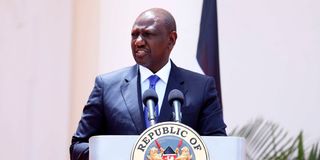Why it is important for us to pay taxes

President William Ruto. Since the Kenya Kwanza Government took over power the president has put pressure on Kenya Revenue Authority to meet the Sh4 trillion revenue target.
President William Ruto’s public proclamation that all Kenyans irrespective of their status should pay tax is timely and should be supported by all.
Countries whose citizens pay taxes promptly and faithfully and where resources are taken care of well have witnessed tremendous development.
The government depends on taxes to meet its expenditure and provide services to the citizens. Tax payment ought to be a civic responsibility for every Kenyan, but not a punitive act.
Since the Kenya Kwanza Government took over power the president has put pressure on Kenya Revenue Authority (KRA) to meet the Sh4 trillion revenue target.
While in power, the Jubilee government charged various individuals and companies with tax-related crimes which have since been withdrawn by the Kenya Kwanza Government.
Chapter 469 of the laws of Kenya provides for the establishment of KRA, a government body that assesses and collects revenue and enforces the laws related to revenue. Therefore, politicians should leave KRA to do its work without coercion.
The government should find better and more modern methods to collect taxes from all Kenyans irrespective of political affiliations.
In an effort to raise more taxes, the government should probably roll out a Voluntary Tax Disclosure Program (VIDP) where companies and citizens declare any unpaid taxes. Additionally, there can be exemptions on penalties.
Moreover, to increase the tax bracket, the government ought to make more players pay taxes.
For instance, Paragraph 10 of the first schedule of the Income-tax Act CAP 470 laws of Kenya exempts institutions established for the advancement of religion.
Churches income
Last year, while upholding the tax appeal tribunal ruling, the high court observed that the income of the church arising from tithes, offerings and donations does not fall within the meaning of taxable income, hence not subject to tax.
This is quite a contradiction because the church income is used by some church leaders to buy cars and other personal property. Furthermore, as stated by the government, those selling anointing oil and handkerchiefs for spiritual purposes should pay taxes.
Some unscrupulous Kenyans use weird methods to avoid paying the right taxes by incorrectly declaring imported goods and undervaluing the shipment of goods.
Consequently, the government should lower taxes so that there is citizenry goodwill to pay taxes. Capital Gains Tax (CGT), which is a tax charged on gain accrued from the transfer of property was increased from 5 to 15 per cent, effective January 2023.
Such high increases discourage tax payment and taxpayers might find other unorthodox means to evade this tax.
As a result tax evasion becomes the cheaper route hence denying the government much-needed income.
Martin Olando, Mombasa




